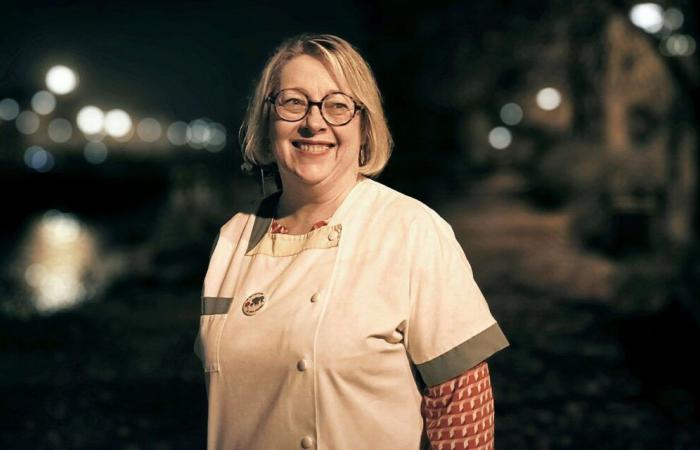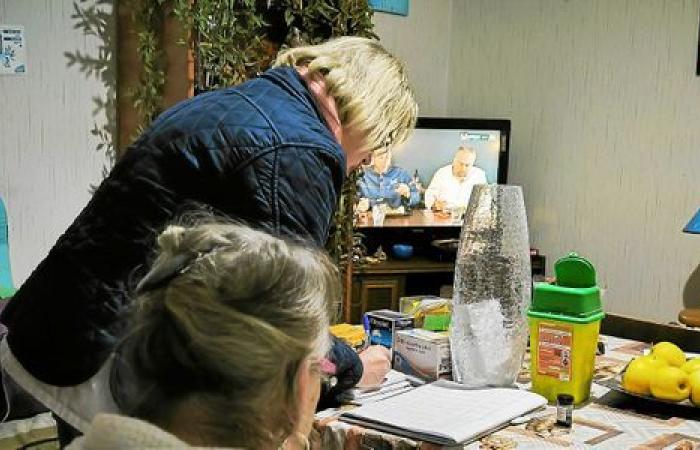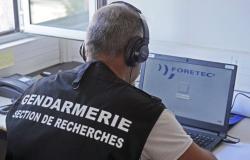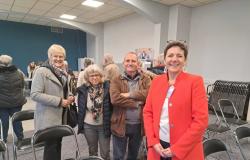6 p.m. strikes from the bell tower, the pale autumn sun has already set and darkness covers Pontivy and its neighborhoods. Round glasses and blonde hair, Laurence Le Pallec, who arranged to meet us on rue de la Fontaine, welcomes us with a broad smile and a slightly hurried walk: her 26th patient of the day is waiting for her at home. For a little injection, a few sweet words and a lot of human warmth, which the nurse spreads wherever she goes.
“We see everything”
Because “people are what I like,” she says, Laurence took up this profession more than thirty years ago. First in the hospital, then in an office. A job with flexible hours, which sometimes tastes like tears and disillusionment. “The profession is suffering,” recalls the caregiver. Many colleagues burn out and leave the profession. We feel pressure, particularly from health insurance and certain patients.” Laurence's are between 15 and 101 years old and have very different pathologies. “Chemotherapy monitoring at home, more or less complex dressings, vaccines, hygiene care, clinical monitoring, blood tests, insulin injections, we see everything,” lists the Pontivyenne.
“Great and essential! »
When we followed her, many of her patients were diabetic. Like Marc, 86 years old. An old acquaintance: Laurence has followed him every day for five years. With, at the end of the needle, this reflection from the octogenarian: “How will I do without her? “.
Mireille, beautiful Italian, abounds. “Laurence is very precious to me,” agrees the septuagenarian. Plus, I’m alone, so it’s a bit of a visit.” For many elders, loneliness is an unbearable wife who has a taste for unhappiness. “When we're not in it, we don't realize all the social problems and dependencies that exist,” Laurence is alarmed, before ringing Jean's doorbell. He too is alone. He's almost 90 years old, with a cheerful demeanor, a magnetic kindness but damn diabetes. “Like all caregivers, Laurence is wonderful and indispensable,” whispers in our ear this retired automobile worker for whom this weekly visit is a handful of joy that must be held tight and for as long as possible. “Come into the kitchen, let’s talk!” Ah! And then, I’ll give you some chocolates, it’s almost Christmas.” Jean gives chocolates every evening. And Laurence has lots of chocolates in her car.
“We never turned our backs on him”
It's almost 8 p.m. and the nurse hasn't finished her evening. Soon, she will see Yves, 80 years old, already in bed because he is prey to a worrying neglect. But also Louise, diabetic, who counts the number of apples she is allowed to eat every day. And then Denis, who cannot inject his insulin alone. “For some, our presence is vital. Somehow, we save lives every day,” thinks Laurence, who like many of her colleagues, is alone during her evening rounds. And in this hazardous darkness which consumes looks as well as silhouettes, she retains her phlegm. “Recently, in Lorient, a colleague was robbed in his car because of his caduceus,” she reveals. A few years ago, in the Vélodrome city, in Pontivy, I was not calm but now, I am not too afraid. I'm just being careful. Maybe I'm unconscious? “.
In fact, the caregiver is initially wary of patients with psychiatric disorders. “Faced with them, we are often helpless and with some, we are on our guard. For example, I think of a patient in the office, a little granny, who had a rifle placed on a piece of furniture in her entrance hall. We never turned our backs on him. We think we know people, but…”.
“It’s getting terrible”
People. The patients. “I try to find the little thing that cheers them up. Like tickling the head of a grandpa I have as a patient. We can laugh, we must laugh! “. Yes. Because too often, in these human journeys, tears are never far away. “We inevitably become attached to our patients and when they leave, it’s difficult. Personally, I never go to funerals because you have to protect yourself, put up barriers. Otherwise, it becomes terrible.” A pain that no bandage, no injection can cure.
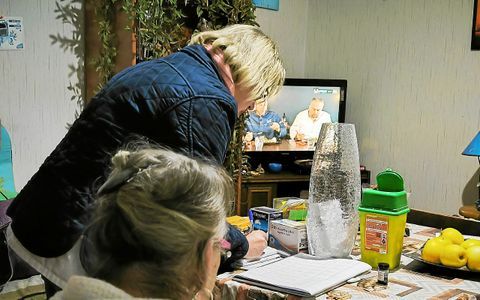
It is now 9 p.m. and Laurence, who started at 7 a.m., returns home after “a marathon day”. With this feeling of having done good to people. For helping them. Neat. Comforted. But his day is not really over: “we always come home with a little paperwork to do…”.

